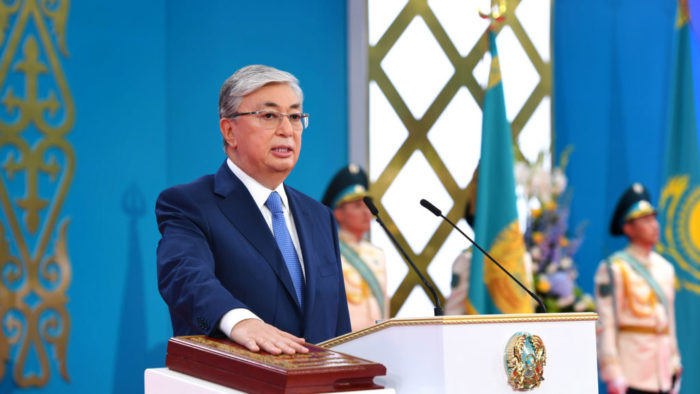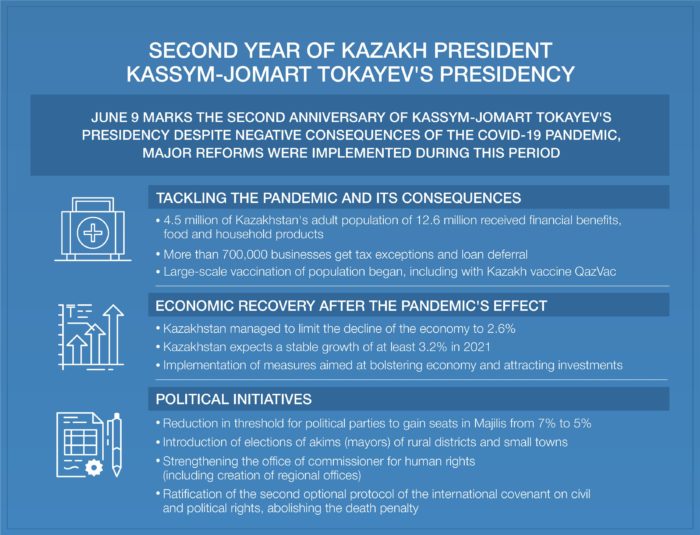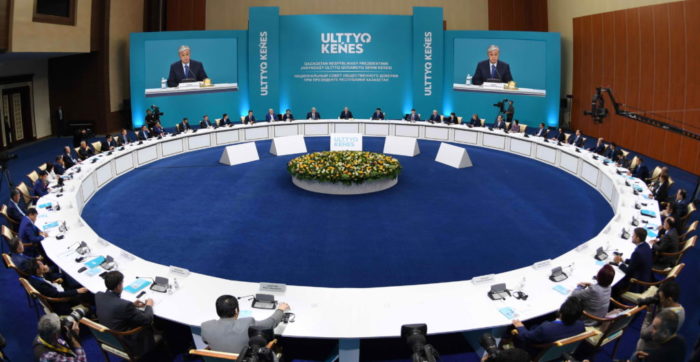June 9 marks two years since Kassym-Jomart Tokayev became the President of Kazakhstan following presidential elections in 2019. The last twelve months have undoubtedly been overshadowed by the global health crisis caused by the COVID-19 pandemic. Nevertheless, major political reforms have been implemented in Kazakhstan during this period that have transformed the country and contributed to its ongoing democratisation.

The inauguration of Kazakh President Kassym-Jomart Tokayev took place June 12, 2019 at the Palace of Independence in the capital. Tokayev swore an oath to the people of the country and officially assumed the office of the President. Photo credit: Akorda.
In 2019, nobody could have predicted that last year all global leaders would be focused on battling a raging global pandemic and its terrible impact on the economy and society. Kazakhstan, like other countries, had to endure major hardships in 2020 and the first half of 2021. To stop the spread of the virus, President Tokayev introduced a state of emergency in Kazakhstan in March last year, which included strict quarantine measures. Naturally, while limiting the spread of the virus, this negatively impacted businesses and the economy. To support the population during this period, according to government data, more than 4.5 million people received financial benefits, and more than 700,000 companies and entrepreneurs were supported through tax exemptions. Approximately 2 million people received a loan deferral. These measures helped to support those most in need, as well as small and medium private businesses.

Despite the challenges presented by the COVID-19 pandemic, Kazakhstan managed to limit the drop of its economy to 2.6 percent. Though this is a substantial decline compared to the 4 percent growth in 2019, it is not as severe as in other countries. For example, the UK’s economy shrank by almost 10 percent in 2020, the U.S. economy by 3.5 percent, while overall economic activity among advanced economies reduced by approximately 7 percent last year. Thanks to the measures implemented by the Kazakh government, the nation expects a decent GDP growth of at least 3.2 percent in 2021.
The fiscal reforms that have been introduced over the past year have contributed to a sturdier foundation for the Kazakh economy. For example, measures have been implemented to improve taxation and use of land. A moratorium on the creation of new state-owned companies and quasi-public sector entities has been imposed, micro and small business entities have been exempted from paying taxes, and a 3-year ban on their inspections by authorized state bodies has been introduced. The execution of tax obligations has been simplified, including through digitalisation. To further enhance the private sector, the Agency for Protection and Development of Competition has been created, while the Financial Monitoring Agency has been established to fight against the shadow economy, with the aim of reducing its level to 15 percent by 2025.

The first meeting of the National Council of Public Trust was held Sept. 6 in 2019. The National Council of Public Trust was established to facilitate public input in the formation of national policies.
Over the last twelve months, President Tokayev has also made it a priority to reform the system of investment attraction and support. In this regard, a Task Force team has been created to provide end-to-end support to investors. These and other economic initiatives helped to keep Kazakhstan’s economy afloat during a turbulent 2020 and should contribute to a faster growth rate going forward.
The fact that Kazakhstan managed to keep its economy relatively resilient and resistant to external threats means that the country was able to introduce and implement an extensive list of political reforms – arguably the flagship of Tokayev’s second year as president. For example, a new law on assemblies has made it easier to organise and participate in rallies. A 30 percent quota for women and youth representatives on electoral party lists has been implemented to widen participation in politics. Libel has been decriminalised, and the Second Optional Protocol of the International Covenant on Civil and Political Rights, abolishing the death penalty, has been ratified. To promote parliamentarism and encourage political pluralism, the number of members required for the establishment of political parties has been reduced by half, and the threshold for political parties to gain seats in the lower house of parliament has recently been lowered from 7 percent to 5 percent. Elections of rural Mayors has also been introduced. As President Tokayev noted, these reforms are aimed at promoting the protection of human rights, as well as political plurality and competition in Kazakhstan. The journey towards further democratisation began following the 2019 presidential election, and its pace increased during the second year of Tokayev’s presidency.
Going forward, the priority for Kazakhstan’s government will be to prevent another rise in the COVID-19 infections and to ensure economic growth and further rise in living standards of its citizens. To achieve the former, large-scale vaccination of the population has been launched throughout the country, mainly with the Russian-made vaccine “Sputnik V” and the Kazakh vaccine “QazVac”, which was registered by the World Health Organisation as a candidate vaccine in May last year. Sinopharm’s UAE-produced Hayat-Vax and CoronaVac developed by Chinese companies have recently joined the pool.
Let us hope that the gradual fall in the COVID-19 infection rate and an imminent return to normalcy will enable Kazakhstan to focus further on implementing political and economic reforms, which will continue to transform the country for the better.

